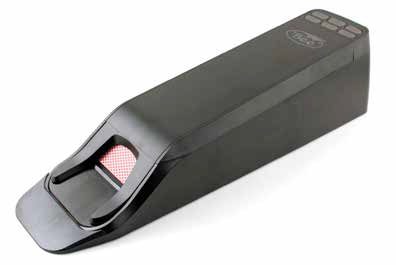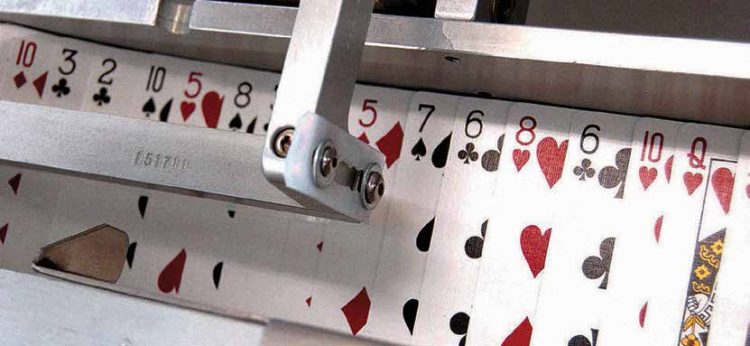The United States Playing Card Company is on a mission to increase sales and support to Asian casinos with its customer-focused mind-set
As far as the global playing cards business is concerned, Asia is where it’s at.
That’s a result of the widespread practice of “squeezing cards” in baccarat—where players slowly peel back each card dealt to them, usually loudly and emphatically expressing either delight or disappointment as the result is revealed. In the process, the cards are mangled and can therefore only be used once. Card squeezing not only prolongs and heightens the drama and excitement of each round, but importantly, also feeds the belief among many Chinese players that they can influence the outcome of the game by channeling their energy into the cards. That belief, bolstered by the other prevalent belief that the outcome of each round can be predicted by referring to past patterns, underlies the insatiable appetite for baccarat among Chinese players.
Of course, the other big reason casinos in Macau have a much higher propensity than their international counterparts to use each deck only once is that much larger wagers are involved. Compromising the integrity of the games at Macau’s tables costs much more than any potential savings from reusing cards.
The United States Playing Card Company has been supplying playing cards since 1867, and its brands, including Bee, Bicycle and Congress, remain the most internationally recognized in their respective categories.
Although USPC is the undisputed market leader in the US, Asia is dominated by a competing supplier. The most coveted of Asian markets is Macau, where the popularity of baccarat results in the consumption of more than 100 million decks of cards a year. USPC has its focus set firmly on that market, having opened a Macau office in December 2011.
“My role is to grow the USPC and Bee brand globally, but a large part of that is in Macau,” says Brand Manager Kyle Nicholson. “It’s a brand that has heritage. At one time we dominated the market. We’ve had steps back, but we think we can listen to the customer more now and hopefully become a leader again.”
He emphasizes a number of “important differences” which he says set USPC’s products apart.
“If you look at the core product, our cards, we’re the only manufacturer in the world that makes our own paper stock, and that allows us to do unique things. For example, we can control for the unique climate of Macau. So if you think globally, Las Vegas in the US is a desert, in Macau you have a very humid climate. We can manufacture the paper in slightly different ways to compensate for the unique climate of each market, which prevents card-warping. The unique properties of our cards also resist dirt accumulation. This prevents jamming of the shoes. And any type of jam, any stoppage of play, costs properties money. And for games where cards are reused, our cards are more reliable in the shufflers, so you can keep those cards on the tables longer without jamming.”
He adds, “We’re also 100% recyclable. If you look at competitors,often inside the paper they also put a thin layer of plastic, which you can’t recycle because of that. Even in our manufacturing process there’s no waste. All the scrap, the products we use, everything down to the containers the ink comes in, we recycle. That’s an opportunity for some of these larger corporate owners that want to be more sustainable.”

Another key differentiating feature of the USPC manufacturing process is that it is highly automated. The company believes greater automation leads to fewer mistakes and lessens the risk of security breaches. The company’s 570,000-square-foot manufacturing plant in Kentucky produces almost a half-million cards daily for both casino use and for various retail brands.
Another important part of USPC’s mission to grow its footprint in Asia is the Bee-Tek intelligent electronic baccarat shoe, which forms the backbone of the company’s baccarat solution.
“Our shoe provides incredible value for properties, especially with its overdraw protection function,” explains Mr Nicholson. “In baccarat, when someone tries to pull an extra card, there’s a plastic mechanism on our shoe that raises up and prevents them from pulling that card. It stops those confrontations, especially in the VIP rooms, where there could be a hundred thousand or million dollars on a specific hand. No property wants to have controversy.”
Furthermore, according to Mr Nicholson, “We are not aware of any of our shoes ever having mis-read a card value. The shoe actually reads the value of the card when it’s pulled through, and we are the only manufacturer where there has never been a card pulled in live play that has been read incorrectly. If it’s an ace, and the shoe thinks it’s a 10, that’s an issue. And even if it’s rare (it might only happen once or twice), if it happens that once or twice on a critical player, a critical VIP, it hurts the relationship with that customer.”
Mr Nicholson says it’s important to have more than one major supplier of cards in the market. “The same way you manage your security risk, you should also manage your supply chain risk,” he says. And USPC also has customers in the Philippines, Korea, Vietnam, New Zealand and Australia,” he says.
In the meantime, USPC is focused on “talking to the customers and gathering feedback,” he adds.
“We want to be a customer-driven company. We want to learn, particularly as we work on future innovation.”
































